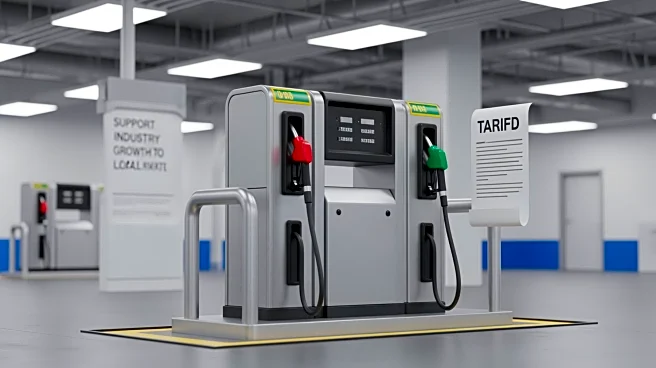What's Happening?
The Manufacturers Association of Nigeria (MAN) has endorsed the Federal Government's decision to implement a 15% import tariff on petrol and diesel. This policy is seen as a strategic move to promote local content and support the 'Nigeria First' agenda.
MAN believes the tariff will enhance energy sovereignty, industrial competitiveness, and sustainable economic growth. The association has called for transparent price monitoring by government regulators to prevent excessive mark-ups and anti-competitive behavior. MAN also advocates for reinvesting tariff proceeds into energy infrastructure and providing incentives for small and medium manufacturers reliant on diesel generators.
Why It's Important?
The endorsement of the import tariff by MAN highlights its potential impact on Nigeria's industrial sector. By encouraging local refining and reducing dependency on imported petroleum products, the policy aims to conserve foreign exchange and stabilize the Naira. This move is expected to attract investment in domestic refineries, create employment opportunities, and strengthen industrial linkages. The tariff is seen as a tool to protect domestic producers, curb dumping, and ensure a stable environment for local refiners. Overall, the policy is positioned as a vital step towards achieving energy independence and industrial sustainability in Nigeria.
What's Next?
MAN has urged the government to support local refiners during the transition period to prevent supply shocks, especially with the festive season approaching. The association also calls for continuous engagement among stakeholders in the energy sector to ensure policy coherence and market stability. Additionally, MAN emphasizes the need for full privatization of government-owned refineries to stop financial losses and promote efficiency. The association remains committed to supporting the government's 'Nigeria First' policy direction, particularly in local content development and industrialization.
Beyond the Headlines
The policy could lead to long-term shifts in Nigeria's energy sector by promoting local value addition and strengthening domestic refining capacity. It may also foster a more favorable macroeconomic environment for investment by improving the stability of the Naira. The focus on local content development could stimulate demand for Nigerian engineering, fabrication, and logistics services, further integrating the energy value chain.














